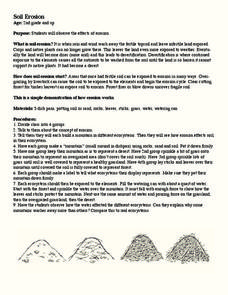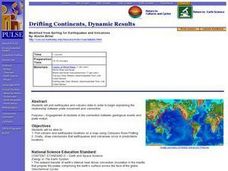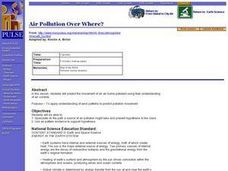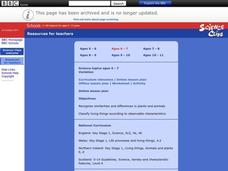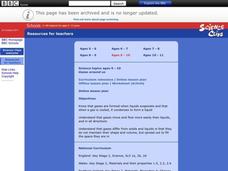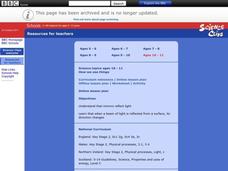Curated OER
Soil Erosion
Second graders complete activities to observe the effects of erosion. In this erosion lesson, 2nd graders define erosion and learn the process. Students complete an erosion experiment.
Curated OER
Using Soil properties and Vegetation Differences to Hypothesize the Land Use History and Topographic Differences between Two Locations
Ninth graders take soil samples and perform tests on these samples.
Curated OER
Watershed Management
Students investigate the concept of a watershed. They conduct research into the concept using a variety of resources. Students take a field trip to a local watershed to make observations. The outcome is a report concerning the outside...
Curated OER
Drifting Continents, Dynamic Results
Students plot earthquake and volcano data using a Compass Rose Plotting. They explain the relationship between plate movement and connection. They draw conclusions that earthquakes and volcanoes occur in predictable locations.
Curated OER
Fallout!
Students plot the locations of fallout from two disasters that polluted much of the world's air. They plot the ash fallout from the 1980 Mt. St. Helen's eruption to see what the wind patterns in the United States look like overall. Next...
Curated OER
Air Pollution Over Where?
Young scholars predict the movement of an air borne pollutant using their understanding of air currents. They determine which governments and/or communities should be contacted to be forewarned. They also explore the properties of their...
Curated OER
Frozen Film
Students are introduced to the topic of light interference through this hands-on activity. They observe how light reflects off two surfaces and then meets to form an interesting variation of color on a film surface.
Curated OER
Up, Up, and Away
Second graders observe the changes that water has when there is a change in a state of matter. In this lesson they observe the results of applying heat to water with the end result of conversion to a gas.
Curated OER
Ourselves
Students use a website to name and compare external body parts of humans and other animals.
Curated OER
Sound and Hearing - Internet Research
Pupils use a website to help them recognize that sound is generated in a variety of ways and from different sources. They determine that sounds vary in tone and loudness, and learn there are different ways to describe sound.
Curated OER
Moving and Growing
Learners know that humans and some other animals have bony skeletons inside their body. They know that other animals have skeletons on the outside of their bodies. They explain the role of both kinds of skeletons.
Curated OER
Circuits and Conductors
Young scholars participate in an online instructional activity to explain the conductivity of different materials and the effect of changing the power source.
Curated OER
Variation
Learners participate in an online lesson to reinforce the similarities and differences in plants and animals. They classify living things according to observable characteristics.
Curated OER
Gases Around Us
Students participate in an online lesson showing that gases are formed when liquids evaporate and that when a gas is cooled, it condenses to form a liquid, and gases move and flow more easily than liquids, and how gases differ from solids.
Curated OER
Changing State
Students participate in an online lesson to investigate the effects of cooling and heating on water.
Curated OER
Helping Plants Grow Well
Students explain the effect of water, temperature and light on plant growth.
Curated OER
Micro-organisms
Students examine how micro-organisms are living organisms that are often too small to be seen. They explain that micro-organisms may be beneficial or harmful.
Curated OER
Forces in Action
Students ask questions that can be investigated scientifically. They determine how to plan a fair test by changing one factor while keeping other factors the same, to use measurements to draw conclusions and use scientific knowledge to...
Curated OER
How We See Things
Students explain that mirrors reflect light. They examine how when a beam of light is reflected from a surface, its direction changes.
Curated OER
Changing Circuits
Students participate in an online lesson to explain how to make bulbs brighter or dimmer in a series circuit by changing the number or type of components.
Curated OER
Variation
Students practice sorting living things into groups using their characteristics. Using pictures of leaves and animals, they sort them based on their color and shape and write the objects characteristics under the picture. They share...
Curated OER
Moving and Growing
Students work with a partner to brainstorm a list of as many human body parts as possible. Using that list, they circle any one of those that are bones. They are shown a model of the human skeleton and practice locating various bones. ...
Curated OER
Keeping Healthy
Students review what the heart does and why the muscles in the body need oxygen. As a class, they measure their pulse rate while they are resting and after they have jogged for three minutes. They are helped by their teacher to convert...
Curated OER
Grouping and Changing Materials
Students feel and observe different types of materials. Using the internet, they sort objects based on the materials they are made from and justify their reasons for putting it in a certain category. They identify objects that could...


